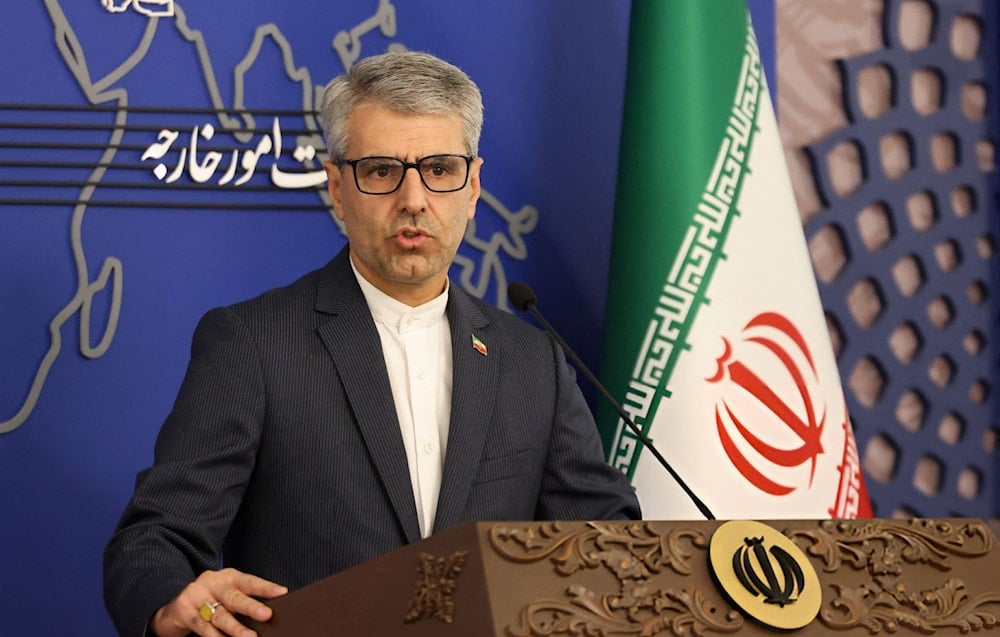Iran condemns US sanctions ahead of 3rd round of nuclear talks with US
Iran denounces new US sanctions targeting its energy sector and peaceful nuclear program, calling them illegal acts that violate human rights and international law.
-
 Iran's foreign ministry spokesman Esmaeil Baghaei holds a weekly press conference in Tehran on October 28, 2024 (AFP)
Iran's foreign ministry spokesman Esmaeil Baghaei holds a weekly press conference in Tehran on October 28, 2024 (AFP)
Iran has strongly condemned US sanctions targeting individuals and legal entities linked to its energy, oil, and gas industries, as well as those involved in the country’s nuclear program.
On Tuesday, the US Treasury imposed sanctions on Iranian liquefied petroleum gas magnate Seyed Asadoollah Emamjomeh and his corporate network.
It claimed in a statement that the network was "collectively responsible for shipping hundreds of millions of dollars’ worth of Iranian LPG and crude oil to foreign markets".
"Emamjomeh and his network sought to export thousands of shipments of LPG -- including from the United States -- to evade US sanctions and generate revenue for Iran," said Treasury Secretary Scott Bessent.
Esmaeil Baqaei, spokesperson for Iran's Ministry of Foreign Affairs, denounced the latest round of US sanctions, describing them as a continuation of Washington's "hostile" policies against the Iranian people.
He stated that targeting Iran’s energy sector and nuclear activities, which he said are conducted for peaceful purposes, reveals the US administration's disregard for international norms.
Economic pressure on developing nations deemed crime against humanity: Baqaei
Baqaei asserted that these sanctions represent a clear violation of international law and the rule of law.
He condemned the economic pressure on developing nations as a tool of intimidation, noting that such actions contravene the United Nations Charter and other global legal frameworks.
The Iranian diplomat stressed that the persistent use of sanctions undermines free trade and constitutes a gross violation of basic human rights, particularly the right to development for those living under such restrictive measures.
He emphasized that the sanctions, especially when impacting essential economic sectors, can in many instances be considered crimes against humanity.
Baqaei highlighted that the US policy of imposing unilateral sanctions lacks any legal justification and instead reflects a bullying approach aimed at forcing political compliance.
Concluding his remarks, Baqaei emphasized that the continued imposition of sanctions is illegal, arbitrary, and incompatible with core principles of international law.
He declared that the US bears international legal responsibility for the adverse consequences of its actions, calling for accountability over the human rights impact of sanctions on the Iranian people.
US sanctions ahead of 3rd round of indirect nuclear talks
The sanctions came as Tehran and Washington held two rounds of indirect nuclear talks in Muscat and Rome since April 12.
Since his return to office in January, US President Donald Trump has reimposed sweeping sanctions under his policy of "maximum pressure" against Tehran.
In March, he sent a letter to the Leader of the Islamic Republic, Sayyed Ali Khamenei, calling for talks but warning of possible military action if they failed to produce a deal.
Oman said the third round, set for next Saturday, April 26, would again be held in Muscat.
On Tuesday, Iran announced that a technical, expert-level nuclear meeting between the two countries will also be held on Saturday, coinciding with the talks.
Following last Saturday's talks in Rome, Araghchi said the meeting was "good" and that the negotiations were "moving forward".
On Monday, Trump said Washington had "very good meetings" on Iran.
Western countries, including the United States, have long accused Iran of seeking to acquire nuclear weapons -- an allegation Tehran has consistently denied, insisting that its programme is for peaceful civilian purposes.
Read more: Iran neither optimistic nor pessimistic on nuclear talks: Pezeshkian

 4 Min Read
4 Min Read









